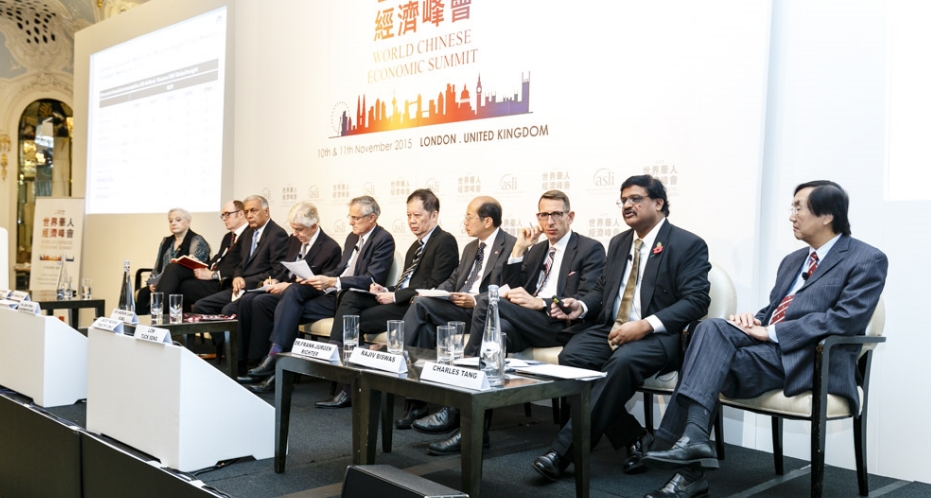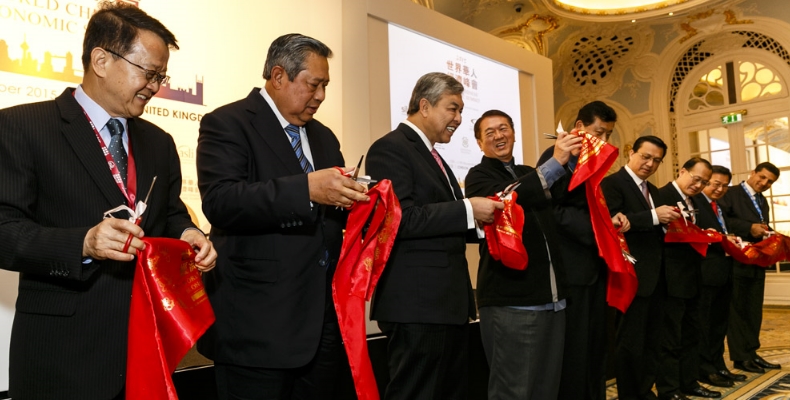Driving commercial and political engagement between Asia, the Middle East and Europe
Driving commercial and political engagement between Asia, the Middle East and Europe
Driving commercial and political engagement between Asia, the Middle East and Europe

China, once known for its low-cost labour, manufacturing hubs and exports, is now on track to becoming a major global consumer market.
This will boost the economies of countries in Southeast Asia, some of which will take over the manufacturing jobs previously done in China. They will also be able to take advantage of China’s growing consumer market. In 2015 the ASEAN region is forecast to grow at 5.2 per cent between 2016 and 2020, according to the Organisation for Economic Cooperation and Development (OECD).
These were some of the comments made during a panel session at the World Chinese Economic Summit (WCES), examining the challenges and prospects of the Chinese economy, which took place this year for the first time at the Savoy Hotel in London, co-organised by Asia House.
“In the past it was ‘Made in China’ now it is ‘Bought in China’ and the future will be ‘Paid in RMB [Chinese currency],’ said Dr Gerard Lyons, Chief Economic Advisor to the Lord Mayor of London Boris Johnson, speaking at the session titled ‘China in the new world economy – what is next for China and the world?’
“Pessimists of China abound,” he said. “They are right. China is slowing down but the long-term trend for China is clearly up. Data suggests we will see a soft landing. But a hard landing is more correct. China is becoming more entrepreneurial and innovative even if in the near term it is slowing down quite significantly, but the longer term is still upwards. “
By 2027 China is set to become the No.1 economy in the world with a GDP forecast of US$31.3 trillion, said Rajiv Biswas, Senior Director and Asia-Pacific Chief Economist, IHS Global Insight, Singapore.
He explained that China’s share of world GDP was five per cent in 2005 and forecast to be 21 per cent in 2035. The US on the contrary would see a decline from a 28 per cent share of world GDP in 2005 to 18 per cent in 2035, he said.
“By 2035 the Chinese consumer market will be bigger than the Western European market. The Chinese service sector is growing as the middle-classes grow. Between 2016 and 2020 the retail sector is set to grow by 7.9 per cent a year. High-growth sectors in China will be aerospace finance, retail, ecommerce, healthcare and communications,” Mr Biswas said. “China is moving up the value chain but we will see tremendous challenges for low-cost manufacturing in the future which will mean lots of job losses, especially in the South Chinese heartland.”
However China’s transformation into a consumer society offers big opportunities to Southeast Asia. The countries that will particularly benefit from the shift in low-cost manufacturing are Cambodia, Vietnam and Myanmar, he said.
Moving towards the service sector is not easy to do, especially in a weak global economy, said former President of the China-Britain Business Council Lord Powell of Bayswater KCMG.
“What we are seeing is a new China in the world economy not a new world economy. China has to do a better job of playing by the rules of the world economy, such as in IP (intellectual property), trade and subsidies,” he added.
He said it was absurd that China was excluded from votes in the International Monetary Fund (IMF), but that it was positive news that the leaders of South Korea, China and Japan were working to promote regional trade and security at their first summit talks for more than three years. He also welcomed the recent historic meeting of the leaders of China and Taiwan.
But he said he was concerned about tensions in the South China Sea and illegal cyberactivities in China.
“We have a great interest in China’s success. We want China to be a good gentle citizen and not a guerrilla on steroids. China has to play by the same rules as the rest of us and we should encourage her to do so.”
Bilateral trade between China and ASEAN totalled US$480 billion in 2014, up 8.3 per cent from the previous year.

Speakers, organisers and sponsors of the World Chinese Economic Summit cut a ribbon to open the conference. Photo by Miles Willis
Lord Powell said the UK was the first country outside Asia to join the Asian Infrastructure Investment Bank (AIIB), because “we feel that the more institutions that invest in infrastructure projects the better.”
“It is not that China is wildly ambitious and wants to stamp its authority everywhere. It is just so big that whatever it does will have an impact – it can’t take a position without it impacting. It does not have malign motives. But the question is, is China capable of allowing entrepreneurship and innovation to flourish? China’s high-tech industry is uninnovative and unimaginative – right now it copies others – it needs its own Silicon Valley but can it do that in the current political system?” he asked.
Chairman of the Brazil-China Chamber of Commerce Charles Tang countered this saying: “Chinese people have always been inventive. China has to reach a certain level of basic necessities. Once they are met they can be very inventive and creative. Why should China or any country reinvent the wheel? We should copy the wheel and build on top of it. Once our basic needs are met you will see a lot of innovation and creativity from the Chinese,” he said, adding the future of China was small and medium-sized private enterprises.
“China will continue to grow and gain friends and make much needed investments around the world. China is investing so much money in Africa that it has transformed Africa from being a lost continent to a continent of hope. It has five of the fastest growing countries in the past five years,” he added.
He also spoke about how regional trade and financial organisations were becoming more empowered.
He said the New Development Bank (NDB) and the AIIB were created partly out of frustration because the Bretton Woods institutions were controlled by debtor nations and China was excluded.
“China has no voice. The Asian Development Bank is controlled by Japan and the IMF by America. The NDB and AIIB were born out of frustration of China’s exclusion,” he said. “China is important. It must have a voice in global markets and financial institutions.
“The USA can learn from the UK how to engage constructively with China,” he added. “The USA did its best to prevent its allie sfrom joining the AIIB. The Trans-Pacific Partnership (TPP) was not created with China and yet constructive engagement with China could do so many great things for the world. If the USA did things the way the Brits are doing, it would be so much better.”
naomi.canton@asiahouse.co.uk
To read the other stories on the World Chinese Economic Summit click here.
Young professionals will be meeting like-minded people at a networking reception with Sir Win Bischoff as the guest speaker on 14 December. To find out more click here.
